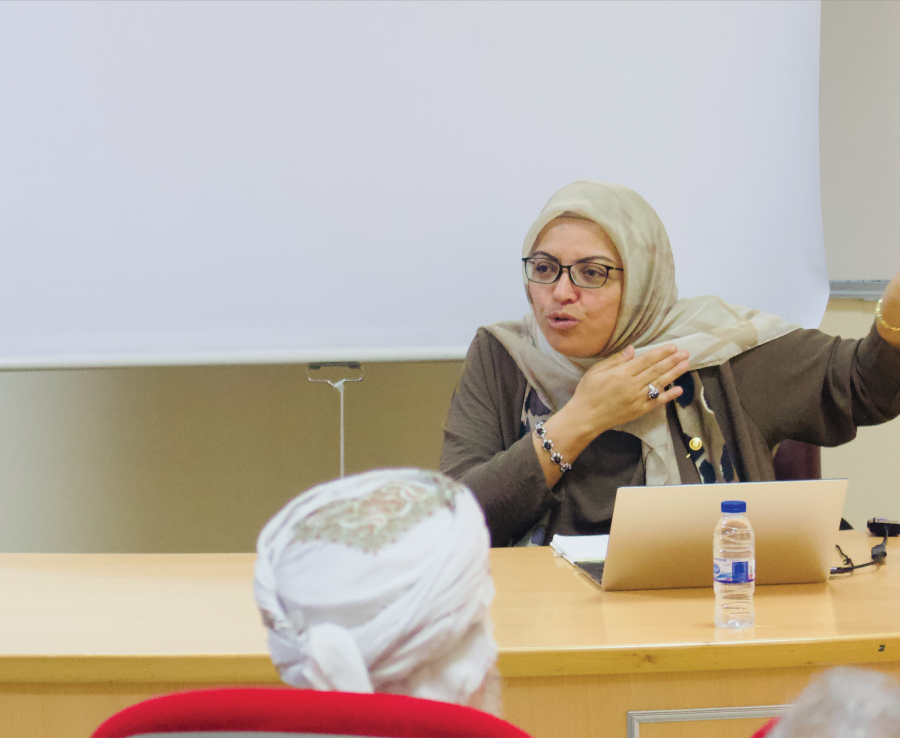Seminar on Heritage Preservation Explores Sustainable Development and Creative Investments in Oman

The College of Engineering and Architecture at the University of Nizwa recently hosted a seminar titled "Heritage Preservation as a Catalyst for Sustainable Development and Creative Investments in Oman:Insights from Harat Al Batina and Nizwa." Dr. Naima Benkari, a renowned professor from Sultan Qaboos University, presented the insightful session. She shared her extensive knowledge of how heritage preservation can drive sustainable development and foster creative investments in the Sultanate.

The seminar commenced with an overview of Oman’s environment, economy, and architecture, establishing a foundation for an in-depth exploration of the country's rich architectural heritage. Dr Benkari emphasised the importance of preserving Oman’s built heritage, particularly in regions steeped in history and culture like Harat Al Batina and Nizwa.
Dr. Benkari recounted stories from her extensive fieldwork and site visits, highlighting Oman's diverse geography, and significantly influencing architectural designs throughout the country. Reflecting on her teaching experience, she recalled instructing students on designing buildings with facades oriented towards the northern and western directions, a common approach in many areas. However, she also conveyed an important lesson learned from her work in Dhofar, where monsoon rains demand an alternative strategy: "I have taught students to design facades facing north and west in Oman; however, due to the monsoon in Dhofar, different considerations must apply," she remarked, underscoring the necessity for context-specific designs.
A pivotal moment in the seminar was Dr Benkari's discussion of the UNESCO-listed protohistoric site of Bat, a location that, unlike other such sites worldwide, is relatively less frequented by tourists. Intrigued by this, she sought to uncover the reasons behind its comparative obscurity. Contrary to her initial assumptions, Dr Benkari found that Omanis are well aware of the significance of their heritage. Nonetheless, she noted that their approach to disseminating this knowledge often differs, with a stronger emphasis on oral traditions and community sharing rather than broad public engagement through media or tourism.
Dr. Benkari also highlighted Harat Al Aqor, a vibrant and increasingly popular tourist destination in Oman. While she acknowledged the growing media attention it is attracting, she expressed concerns regarding the balance between development and preservation. The rapid advancements and construction in the area could potentially overshadow the rich heritage that makes Harat Al Aqor distinctive. She stressed the need for a more coordinated approach between heritage specialists and investors to safeguard the area’s historical value amidst ongoing transformation.
The seminar ignited thoughtful discussions among attendees, who contemplated the importance of preserving Oman’s architectural legacy while simultaneously embracing modernity. Dr Benkari's concerns about the disconnect between heritage specialists and investors highlighted a critical issue that must be addressed to ensure the sustainable development of the country's cultural sites.
In conclusion, the seminar provided invaluable insights into the role of heritage preservation in Oman’s sustainable development. It called for a more integrated approach that harmonises creativity, investment, and cultural conservation. The seminar also underscored the importance of heightened awareness and collaboration to ensure that Oman’s rich heritage is not only preserved but also leveraged to contribute to the country’s future growth.



